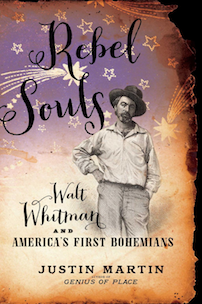By Lewis Fried
Had you wandered into Manhattan’s Pfaff’s Restaurant and Lager Bier Saloon, in its golden years, beginning with the late 1850s, and ending about a decade later, you would find yourself underneath street-level, walking into an establishment hosting a table of American “personalities,“ (my quotation marks) presided over by Henry Clapp Jr., editor of the Saturday Press, and known as “the King of Bohemia.“
Clapp had an unusual story. Henry James would have delighted in it: the clash between a dissolute Europe and a disapproving America. Clapp was born in 1814, in Congregationalist Nantucket. A teetotaler, he came to Paris in 1849, to attend a peace conference. He did not leave early. He stayed for some three years. There, he was introduced not only to the delights of cafes, whisky, and the demimonde, but also to exciting conversation, and what is euphemistically called “women of dubious reputation.” When he returned, he settled in New York, becoming a regular at Pfaff’s saloon, having a table marked out for him.
What makes Clapp’s “table” worthy of attention? Its prominent members were people of the letters and arts: Walt Whitman; the essayist Ada Clare (the “Queen of Bohemia”); the author of that still curious autobiography The Hasheesh Eater, Fitz Hugh Ludlow; actress and poet, the physically stunning Adah Isaacs Menken; Artemus Ward, rising to become one of America’s most renowned humorists; and, the writer Fitz-James O’Brien. In what way were they torch-bearers of that now-common tag, “Bohemian”? Ada Clare noted its markers: cosmopolitan; allied to the “fine arts”; dismissive of “rules and customs” yet “guided by the principles of good taste and feeling”; and above all, not “narrow-minded.”
Their lives were anything but conventional. Many of them, having lived fast, died young. However, as if to transcend their brief years, they composed a circle touching Ralph Waldo Emerson, Mark Twain, Napoleon Sarony, Charles Dickens, and the Booth family of actors (whose most notorious member is John Wilkes Booth).
Moreover, Clapp’s group, although splintering with the course of the Civil War, is embedded in America’s national struggles and self-consciousness. A short list suffices: Fitz-James O’Brien, a writer of intriguing tales of fantasy, killed in the Civil War. Walt Whitman, spending much of his time and money comforting the wounded and dying in various hospitals in Washington, D.C., turned what he had experienced into an enlarged (and enlarging) edition of America’s national poem, Leaves of Grass, as well as a volume of Civil War poetry, Drum-Taps. Fitz-Hugh Ludlow, addicted to drugs, made a hard as well as emotionally unfortunate journey across the West with Albert Bierstadt, the painter of majestic American landscapes, who also would run off with Ludlow’s wife. (The Heart of the Continent, Ludlow’s account of the trek, originally planned to twin his writing with Bierstadt’s art, was revised to dim or erase the painter’s identity as much as possible.) Adah Isaacs Menken, noted for her risqué appearance in the play Mazeppa, as well as her multiple marriages, rose and fell almost regularly, turning on Fortune’s wheel. Ada Clare, a pioneer of nascent American feminism.
What was this group’s influence? Did it transform American culture or register a change? The answer is paradoxical: the group did both, yet strongly and weakly. The debate over the New World—whether America was a unique civilization, and its people, a new phenomenon in world history—is a topic of discussion throughout the development of the Colonies to our own day. The dispute itself points out that America always has been responsive to currents in European life and thought. Rebel Souls shows how one interpreted version of this discussion, that of unconventionality and the striving for wider perspectives, suffused the life of one group of Americans. The members of Clapp’s society were invigorating spirits, helping to loosen an already challenged Puritanical nation.
In addition, the legacy of Clapp’s table was dual: that of the metropolis itself, ingathering yet generating new thought and behavior; and that of cultural circles as national resources, transmitting versions of the “ways of Paris” (and I use this term metaphorically) to the cities and prairies of America.
Martin’s engaging book offers us a wide look at the role of Clapp’s insurrectionary friends, resonating to the appeals of European Bohemias, both real and imagined. One only has to turn to the history (which Martin succinctly offers) of La vie de Boheme, and its reincarnation as Rent, to see the conventions (and conventional sides) of the rebel souls’ influence as well as their youthful audacities.
Lewis Fried (ΦBK, Queen’s College, CUNY, 1964) is Professor of English Emeritus at Kent State University and a resident member of the Nu of Ohio chapter of Phi Beta Kappa.




